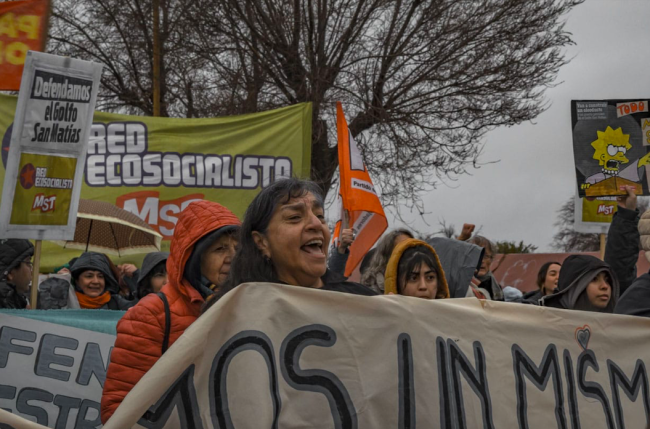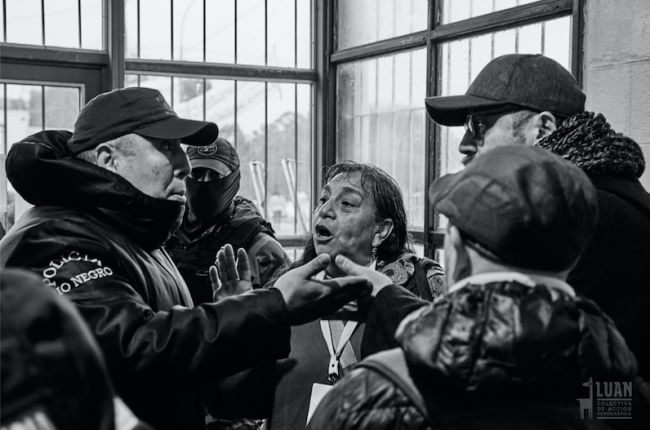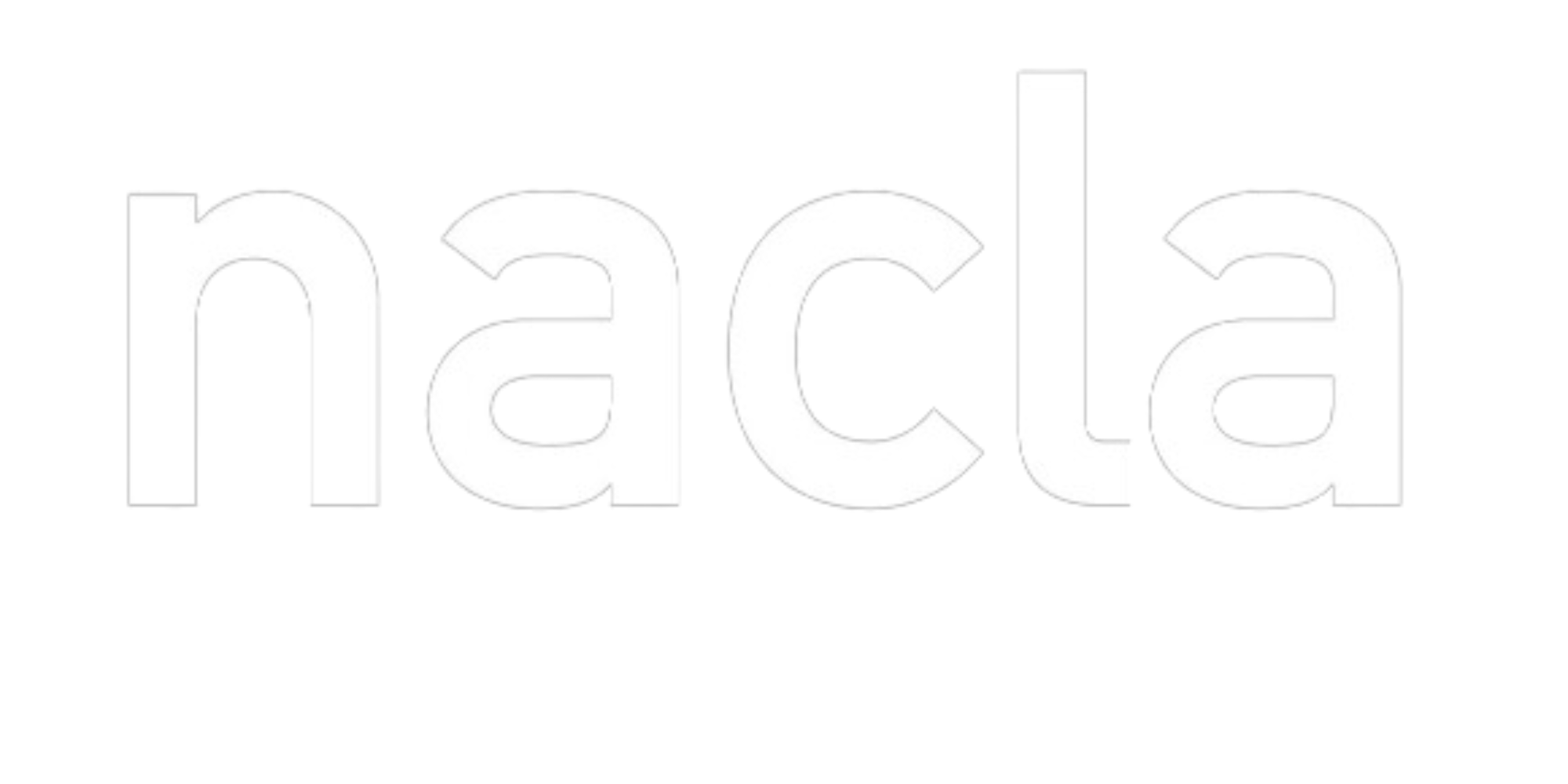
Leer este artículo en español. Translated from Spanish by Karina Gamez.
This interview is part of a series in partnership with Earthworks on oil and gas impacts in South America.
The Vaca Muerta Oil Sur project of the Argentine company Yacimientos Petrolíferos Fiscales (YPF) proposes to build a 565-kilometer pipeline starting in Neuquén, as well as a 250-hectare port terminal and underwater pipeline system connecting to offshore platforms and oil tankers off the coast of Golfo San Matías in the province of Rio Negro. The project will have a huge environmental impact on protected areas along the coast, including the Islote Lobos National Park, a reserve area home to a great diversity of plants and marine and coastal species, such as Magellanic penguins, sea lions, and more.
Suyhay Quilapan is a member of the Assembly for Land and Water of Las Grutas, one of the community environmental organizations that reject the pipeline and oil terminal. She works in the Pastoral Social de Las Grutas, a social work program connected with her local church.
In this interview, Quilapan talks about the struggle to reverse the modification of the 1999 Provincial Law 3308, which prohibited oil and gas prospecting, exploration, and extraction in the Gulf of San Matías and Rio Negro’s territorial sea. She also discusses her community’s efforts to stop the approval of the Vaca Muerta Oil Sur project. I spoke with Quilapan via Zoom on September 8, 2023. Our conversation has been translated from Spanish and edited for length and clarity.
Patricia Rodríguez: I want to start by asking about you and your organization. How did you get involved in this struggle?
Suyhay Quilapan: I am a member of the Assembly for Land and Water of Las Grutas based on a position of faith. I have been working in the Catholic Church since I was a teenager, and I have also encountered different ideologies, such as liberation theology, which promotes the wellbeing of the people and listening to the cries of our peoples. I believe that one of the strongest cries of resistance we have today in Latin America is regarding extractivism.
This, together with the idea of environmental rights as part of fundamental human rights, all converge in the need to join together with other social actors to halt extraction, mainly in the province of Rio Negro, which has become a highly extractivist province. Although the government doesn’t publicize it, today we have seven impending extractivist projects, besides Vaca Muerta Sur, the oil pipeline project in the San Matias Gulf. There are other extractivist projects that have mutated, if you will, the production mix and are expected to have a negative impact on the lives of citizens.
In view of this, we organize ourselves in assemblies. The assemblies always have a horizontal decision-making format. We do not belong to specific political parties. In financial terms, this also makes us self-managing.
PR: Tell us about the Vaca Muerta Sur project and the other forms of extractivism you are facing.
SQ: We have a large oil and gas deposit in the province of Neuquén, called Vaca Muerta, which has already been in a 10-year cycle of extraction with very negative impacts. I was born in Neuquén. I used to live by the Limay and Neuquén rivers, and today I live on the coast at the edge of the sea.
The new Vaca Muerta Sur project is a project in the province of Neuquén that will cross the entire province of Rio Negro to Punta Colorada, in the south of Sierra Grande, which is a neighboring town to us here in Las Grutas. They are going to install the largest oil port on Argentina’s coast for loading ships. This project also includes a transport pipeline. Obviously there will have to be a storage facility on the coast, and then the port for loading the ships. How does this fit within a sustainable development project? A real project for community growth?
Vaca Muerta is 500 kilometers away from Las Grutas, but one can see that there are sacrifice territories. Vaca Muerta has recurring earthquakes, increasing in number and time. This is not made known or taken into account. In fact, when we participated in a public hearing held in Añelo, Neuquén for the first section of Vaca Muerta, seismic activity was not included in the discussion. How is this not going to be considered in the environmental impact study? There are researchers taking measurements in real and daily terms. They are knowledgeable about these issues and share their knowledge with us in solidarity and for the good of the community. They give us the foundation to understand what is happening in the different struggles.
In terms of environmental balance, we know that the marine ecosystem is very fragileeverything impacts it. Currently on our coast in the Gulf of San Matias, there is a decrease in the fish catch. There is fishing extractivism. When one does not take care of natural goods and abuses extraction, it is an abuse even if it is not mining. Unfortunately, fishers are suffering the consequences today, because there were not adequate policies and controls. We have this crisis in the fishing industry, and what does this cause? Unemployment! Fishing companies are closingtwo have already closed. The economy in these places is so fragile because they are not industrialized. Las Grutas lives from fishing and tourism, two activities completely incompatible with fossil fuel activity.
Around here we have Puerto del Este, which used to export fruit from the Alto Valle, which has decreased its production for many reasons. Undoubtedly one of those reasons is the nearby fossil fuel activity. When a food product is to be exported from the country, it has to have export quality, and it cannot have fossil fuel activity nearby. In the Allen area, where pears and apples used to be grown for export, the harvest has already fallen significantly, and this generates unemployment.
We see that we are a greatly sacrificed region, condemned to sacrifice. In “Laudato Si,” Pope Francis talks about the culture of disposability, and I started to associate that idea with the fact that there are disposable communities, disposable provinces, and disposable countries. That is why I think it is extremely important to understand that the Vaca Muerta Sur project is about moving Vaca Muerta toward export, generating sacrifices not only in the Vaca Muerta area, in Neuquén, but also in the province of Rio Negro and the province of Chubut.
We are in the San Matias Gulf. At one end, there is a small gulf, the San José Gulf, and then there’s the Valdés Peninsula, where the whales are. Then there’s an inlet, the Nuevo Gulf. Due to the marine currents, a port will cause the movement of fossil fuels from the cargo ships throughout the area. Some biologists showed us how the currents move, there is no doubt that the contamination goes from South to North, all throughout the San Matías Gulf. Another current moves from North to South, affecting Chubut province. What would happen if there was an oil spill in the San Matías Gulf? Extremely shocking to see this future projection, no?
In reality, in this fight, one of the things we have to do is raise awareness in the community. There was an attempt to install a nuclear plant on the coast in this area. It seemed impossible for us to be able to stop it. We worked on it with all the people of the province, and we held a national march. We managed to stop the installation of the plant.
That is why we know that it is not just about being creative and clear in terms of messaging, but that something has to take root in each citizen that has to do with feeling, with emotions. I think this has marked us. We are never going to give up our hope of having a good life. They will not take away our joy. They take a step and we rethink our strategy. This is communal, never individual. It is a path of making agreements, which is much longer but more solid!
PR: Can you tell us about the environmental law that was modified?
SQ: Of all the provinces of Patagonia, Rio Negro was the only one that had a law protecting the San Matias Gulf from fossil fuel activity. This is because years ago there were two attempts to install an oil pipeline, and we stopped it with community and popular mobilization. We achieved the passage of Law 3308, which is known as the law that protects the Gulf.
When Argentina started to pursue offshore drilling on the coast, in Mar del Plata, we held an Atlanticazo on January 4, 2022. We are a tourist destination, and we receive many tourists from Argentina and the region. At that time, we said, “We’re not worried because we have Law 3308.” We were there to be in solidarity and to boost the struggles of other assemblies.
But in August 2022, we found out that there was a bill to amend Law 3308. We found out just two days before it passed. About six of us went to the legislature and they wouldn’t let us in. They said it was because of Covid-19, but they did let other people in. The Rio Negro legislature requires a first and second round to modify a law. Fifteen days later the second session took place, and we mobilized many more people.
At that time, unfortunately, there were unions that came to support the modification of the law. The UOCRA (Construction Workers’ Union of Argentina) and a fishermen’s union were the shock brigade against those of us who opposed the modification.
They modified the law. There was only one lawmaker who voted against it. We are going to continue to make noise about the modification of the law. But at the same time, the Vaca Muerta Sur project advanced. They called a public hearing in Añelo and we went because Neuquén allowed us to participate, even though we came from another province.
PR: There was a public hearing in Sierra Grande in August about Vaca Muerta Sur. What happened at that hearing?
SQ: The public hearing for the province of Rio Negro took place in Sierra Grande, which is where Punta Colorada is locatedwhere the port is going to be.
It is important to understand a bit of context. There used to be an iron mine in Sierra Grande. When that mine shut down, the miners left to look for work elsewhere. Most of their families stayed in Sierra Grande facing very difficult socioeconomic problems. In the 1990s, President Carlos Menem announced a development model he called the Productive Revolution, which was to be launched in Sierra Grande. This never happened. Then the mine was handed over to a Chinese company, which extracted everything they could. The labor relationship with the workers was disastrousextremely tyrannical. Every time there’s a project that they have nowhere to put, they put it in Sierra Grande. A nuclear plant, green hydrogen. It is a painful story of a real sacrifice zone.
So when we arrived at the public hearing, there was a riled up violent group telling us to leave, that they needed work. We understood where their pain was coming from, but we also understood that there was an intentional policy against allowing us into the hearing to speak. The head of operations told us we had arrived late. We discussed and we managed to get them to allow in 10 people, six of us against the project and four in favor.

Another much more violent group from the construction union arrived, the one that had been violent toward us at the legislature the previous year. So we could see that this was the violent wing of political power in the province. They were becoming more and more violent outside, with pushing and shoving and the removal of some people to avoid confrontations. Inside, I was number 112 to speak. Waiting for the six of us to speak would have meant putting everyone outside at risk, so we could not stay.
Although we put body and soul into this struggle, we also have to take care of ourselves. Argentina has had 40 years of democracy. We should have learned that thinking differently does not make us enemies. It is a matter of democratic coexistence and citizen participation.
PR: What are the next steps for your struggle?
SQ: We know that an environmental impact study is being conducted that leaves a lot out. First, the study is segmented into three parts, but it is a single project. It has to be published and disseminated in language that a non-specialized local resident can understand. But the text is inaccessible. From that perspective, we know that it does not comply with the law. The environmental impact study had parts in English, and not everyone speaks English. Besides, there is the issue that compañeros from Chubut could not participate, nor could compañeros from Neuquén. If Chubut risks being impacted, how can they not carry out an environmental impact study in that area? They were left out.
The other thing we object to has to do with Indigenous communities. Indigenous peoples have rights guaranteed in the constitution, and there is also ILO Convention 169, which states that there must be a free, prior, and informed consultation. If the consultation results in rejection, that has to be respected.
The project represents death, not only in the human sense, but also in terms of future projects. When we think of progress or development, these are concepts that we have to unravel and give new meaning to. The words have been emptied of their content. The project must be centered on people, not capital. People must be guaranteed what they need for the reproduction of life. Capitalism cannot be the only alternative. Another economy is possible, which is linked in Latin America with Indigenous peoples, with buen vivir (good living). Perhaps this is the emancipatory path.
PR: These struggles give a kind of hope, don’t they?
SQ: I always believed that there was something that the Church did not put into words, and when I read “Laudato Si,” I saw in Pope Francis’s words that he talked about environmental issues but also development, the economy. This has to be discussed. Maybe what we are doing is a grain of sand, but it is the hope.
PR: For people reading this interview, what would you say they can do to support your demands?
SQ: Let it be known that in Patagonia there is extractivism, that our coasts are at risk from exploitation, oil wells, and more.
On social media, we’re Defendamos el Golfo (Let’s defend the Gulf). We believe that through discussion and joining forces, we can spread awareness about caring for the environment.
Today in Argentina, we face a disastrous landscape in terms of politics. It’s very worrisome. What is happening in the province of Jujuy, in the north of Argentina, with the modification of the provincial constitution, the denial of the Indigenous’ right to their lands to extract lithiumit’s extractivism! And here in our province they also want to extract lithium. That is not the way. These are common natural goods. Common goods are something to be cared for and loved.
Patricia Rodríguez works as International OGI (Optical Gas Imaging) Analyst and Advocate at Earthworks. OGI is an infrared technology that detects fugitive and poorly combusted emissions of methane and volatile organic compounds from the gas and oil industry.

